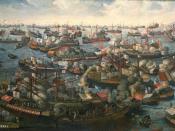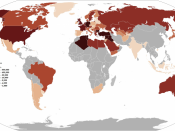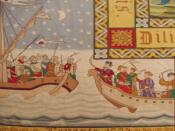÷ Lepanto was said to be the most spectacular navel battle of the 16th century and indeed a permanent mark on military history. In the history of armed conflict at sea, there is no battle better known and less understood than Lepanto.
÷ Lepanto to a large extent was a clash of the civilisations. It was an East vs West battle, but we must remember that the East and West are more ideological than geographical.
÷ The civilisation of Christiandom was under attack.
÷ The war was between the Venetian, Papal and Spanish fleet led by Don John of The Netherlands against the Ottomans. The battle was essentially Christians versus Islam.
÷ Despite being unexpected, the battle of Lepanto had few consequences. Braudel, however, asserts that the consequences would have been far more numerous had the battle been won by the Ottomans or if it had not happened at all.
÷ The main discernable outcome of Lepanto was that it broke the Turkish supremecy.
÷ Christian galleys received many slaves and oarsmen from the battle.
÷ The League was an alliance formed to unite against 'the Turk' and, after many long delays and setbacks, was signed on the 20th of May 1571. The Pope was said to be the chief architect of the alliance.
÷ Unity was achieved between great powers to overcome the Turk.
÷ There was much hostility between signiteurs, with the Papal party being the most enthusiastic to sign, and the Venetians the least. The widespread suspicion and distrust slowed the course of action.
÷ The Venetians had symbiotic relations with the Ottomans and had to trade through their land, which may explain why they were reluctant to sign.
÷ Different interests between the powers of Europe prevented unity against the outsider.
÷ Talks began in early...


